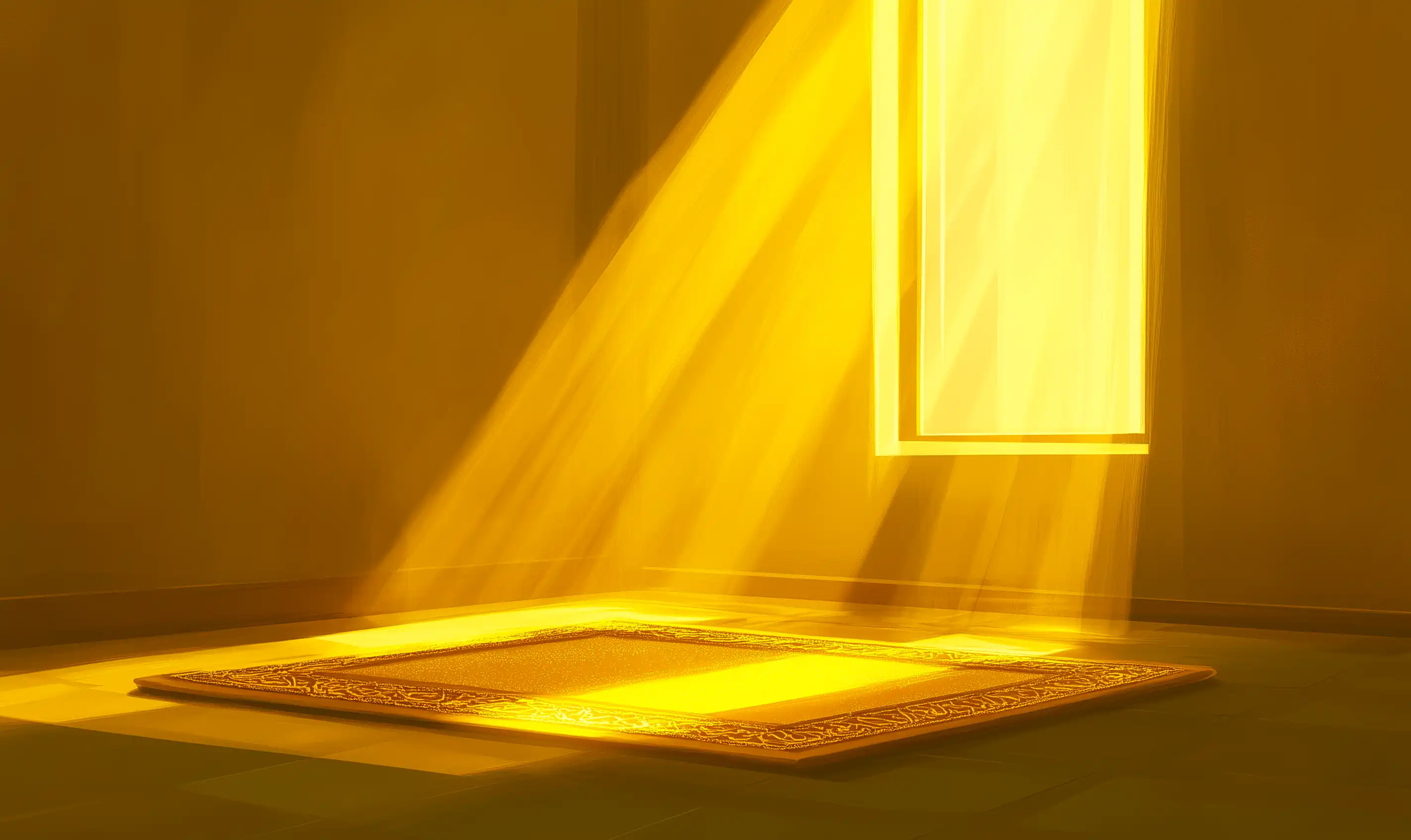Is salah the same as meditation?
Meditation is familiar to many, but Salah (prayer) is deeper. Let’s explore how prayer compares and why it transforms differently.

In this article
The quiet moment we all long for
Have you ever noticed how life keeps getting louder? Work emails, phone notifications, family responsibilities, endless scrolling. No wonder so many people turn to meditation. They want a moment to breathe and quiet their racing minds. Maybe you have tried sitting in silence, focusing on your breath, letting thoughts come and go.
It can feel peaceful for a while. But then, as soon as life speeds up again, the calm slips away. That’s when a question begins to form: is there something more lasting than simply "feeling calm"?
For Muslims, the answer is yes. It is salah.
Meditation empties your mind but salah fills your heart
Modern meditation often teaches you to let go of thoughts and stay in the present moment. This can help ease stress, but it stops at the mind. Salah, on the other hand, is not just an exercise in being present but it is an act of standing in the presence of Allah, speaking to Him directly.
When you recite Surah Al-Fatihah, you are not just saying words or random affirmations. You are acknowledging Allah’s mercy, asking for guidance, and seeking protection from going astray. Every movement, every verse, is a reminder of who you are and Who you are facing. Learn more on the words recited in prayer.
Meditation might tell you to focus on your breath but salah tells you to focus on the One who gave you breath in the first place.
Meeting with the Creator is more than just stillness
The saying goes that meditation may help you connect to your inner self but salah will connect you to the One who created your inner self.
In meditation, you sit with yourself but in salah, you stand before Allah, bow to Him, and prostrate in the most humble position a human can take.
The Prophet Muhammad ﷺ said,
The nearest a servant comes to his Lord is when he is prostrating himself, so make supplication (in this state).
Sahih Muslim∙482
That closeness is not just emotional but spiritual. It is a conversation. No meditation app or course can match the intimacy of that exchange.
The rhythm that keeps your heart steady
Meditation is something you do when you remember to. Salah is something Allah commanded five times a day.
Even if your day is chaotic, salah carves out moments of pause that you cannot skip without feeling the difference.
Imagine your heart being like a plant. Meditation is the cold breeze that comes every now and then when you think of it but salah waters it at set times so it never dries out.
Allah says,
ٱتْلُ مَآ أُوحِىَ إِلَيْكَ مِنَ ٱلْكِتَـٰبِ وَأَقِمِ ٱلصَّلَوٰةَ ۖ إِنَّ ٱلصَّلَوٰةَ تَنْهَىٰ عَنِ ٱلْفَحْشَآءِ وَٱلْمُنكَرِ ۗ وَلَذِكْرُ ٱللَّهِ أَكْبَرُ ۗ وَٱللَّهُ يَعْلَمُ مَا تَصْنَعُونَ ٤٥Recite what has been revealed to you of the Book and establish prayer. Indeed, ˹genuine˺ prayer should deter ˹one˺ from indecency and wickedness. The remembrance of Allah is ˹an˺ even greater ˹deterrent˺. And Allah ˹fully˺ knows what you ˹all˺ do.
Al-Ankabut (The Spider)∙29:45
This is not just about calming the mind, it is about shaping the soul.
The focus that never fades
One challenge with meditation is that the effects can fade quickly. You might feel calm after ten minutes of deep breathing, but an email notification can take it away.
Salah plants something deeper inside you. It reminds you of your purpose, your Creator, your final destination. You leave not just calmer but anchored.
When you stand, bow, and prostrate, your body, mind, and heart align in worship. This alignment builds a resilience that does not vanish as easily.
Can you meditate in Islam?
Some Muslims wonder if it is okay to meditate in the modern sense. The answer is that reflection, quiet thinking, and remembering Allah are encouraged in Islam.
The Prophet ﷺ would spend time in the Cave of Hira reflecting before the revelation began. But when he received the command for salah, that became the central act of worship that anchors the believer’s day.
So, if you enjoy mindfulness practices, the best way to elevate them is to remember Allah during them. Instead of simply focusing on the breath, reflect on how Allah gave you life. Instead of emptying the mind completely, fill it with dhikr (remembrance), such as SubhanAllah (Glory be to Allah), Alhamdulillah (Praise be to Allah), and Allahu Akbar (Allah is the greatest).
Salah is the heart of Islamic mindfulness
If meditation to you is like pausing in the middle of a storm, salah is like stepping into a safe shelter where you speak to the One who controls the storm.
The beauty is that salah is not just about feeling peaceful for a moment, it changes you over time. It strengthens your faith, purifies your heart, and draws you closer to Allah day after day.
So the question is not just, “Is salah the same as meditation?” It is, “Why settle for less when Allah has given you something greater?”
Taking the next step
If you have been curious about meditation because you want peace, remember that true peace comes from the remembrance of Allah. Salah is the most complete way to remember Him.
And if you want to make your salah deeper and more focused, there are ways to learn and grow. That is why we built Hira, a Muslim prayer and mindfulness app designed to help you connect with Allah in every prayer, every moment, every breath.
Your quiet is important. Your connection to Allah is even more important. Start where you are, but aim for where Allah wants you to be.
